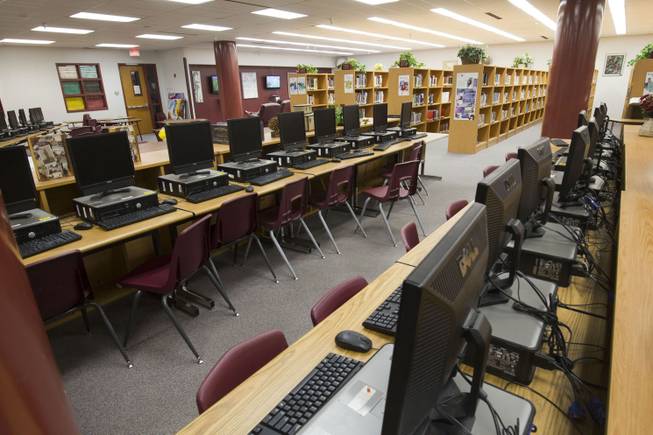
The SBAC is an adaptive test, meaning it becomes more or less difficult depending on a student’s answers.
Thursday, April 7, 2016 | 2 a.m.
Spring is the season of standardized testing in Nevada.
And as students around Las Vegas gear up to take the Common Core-aligned tests, officials in the Clark County School District continue to cross their fingers in hopes they'll avoid a disaster like last year.
So far, so good.
As of this week, around 7 percent of third- through eighth-graders in Clark County have completed the Smarter Balanced assessment since testing began in March.
While that may not seem like a lot, it’s more than the number of students who took the test in total last year.
The tests, which are taken on computers logged in to the testing company’s servers, were notorious last year after constant technical problems ruined any chance of the state meeting the federal government’s testing mandate. In the end, only 5 percent of students in Clark County were able to finish the tests.
But the state is back with a vengeance, and a new testing company.
Measured Progress, the New Hampshire-based company widely blamed for the testing woes, was replaced by testing giant CTB/McGraw-Hill last August. County school officials say the process has gone much smoother under the new company as well as its subcontractor, Data Recognition Corporation, which is responsible for making sure the testing itself runs smoothly.
“We’re in a much better place than we were last year,” said Tiffany Seibel, director of assessment for CCSD.
“Knock on wood,” she added. “I don’t want to jinx us.”
The tests are crucial, not just for Nevada but every state that relies on the federal government for funding. When Nevada failed to test 95 percent of its students as required, it was at risk of losing crucial funds for low-income schools.
The results from the tests are used to determine which schools and districts are doing a good job of educating students. They are seen as essential by the federal government in ensuring accountability, even though some criticize the tests as unfairly penalizing schools and teachers that teach the most struggling students in at-risk areas.
The results from Nevada’s standardized tests are used, for instance, to determine school star ratings on the Nevada School Performance Framework. However, those ratings were temporarily put on hold this year due to the testing problems.
In the end, the U.S. Department of Education granted Nevada a waver from the requirements, but it may not do so a second time.
Over 100,000 students are expected to complete the Smarter Balanced test this spring, which poses a huge technological challenge for school districts. By the end of testing, CCSD will have administered over 600,000 individual computerized tests. That’s because students take the Smarter Balanced test in installments and completing it entirely often takes days.
Luckily, testing officials got a crash course in the new testing platform in January, when students were taking English language proficiency assessments using the same computer system.
“We learned a lot of lessons when we weren’t having to test 100,000 kids at the same time,” said Seibel.
So far there have only been a couple technical hiccups that interrupted test-taking, according to Seibel, but they only lasted around 15 minutes and weren’t caused by the testing itself.
Smarter Balanced testing ends May 31.

Join the Discussion:
Check this out for a full explanation of our conversion to the LiveFyre commenting system and instructions on how to sign up for an account.
Full comments policy